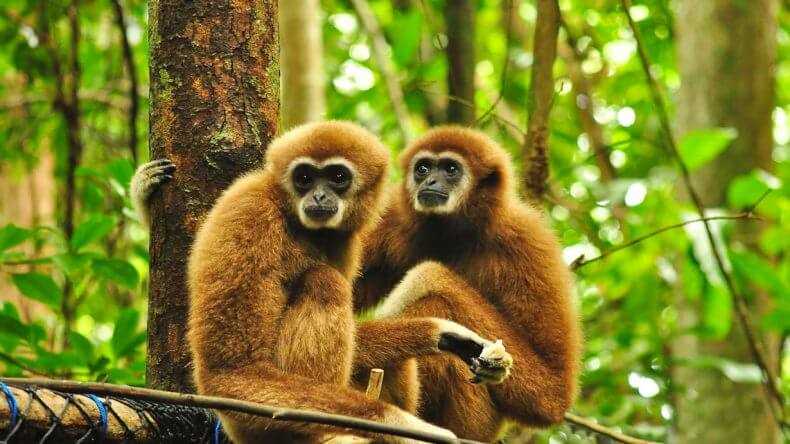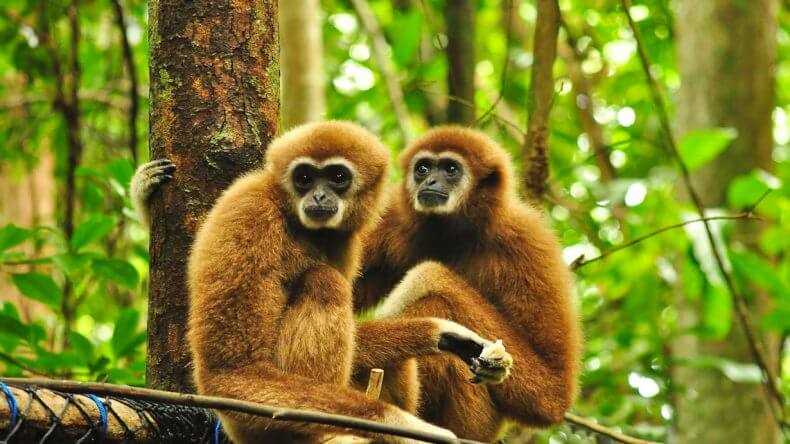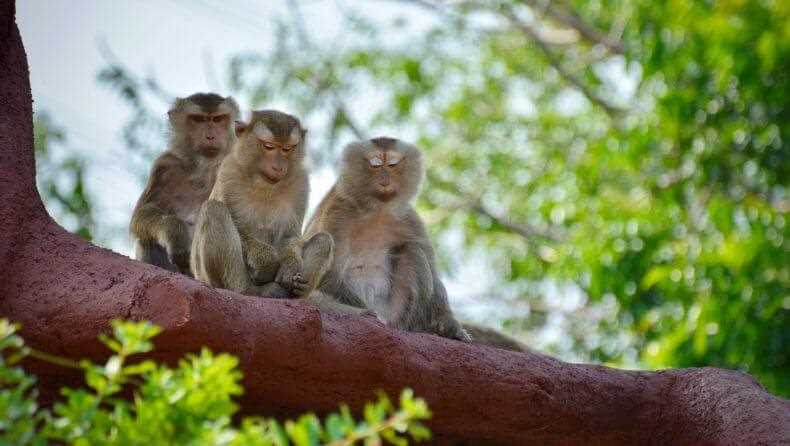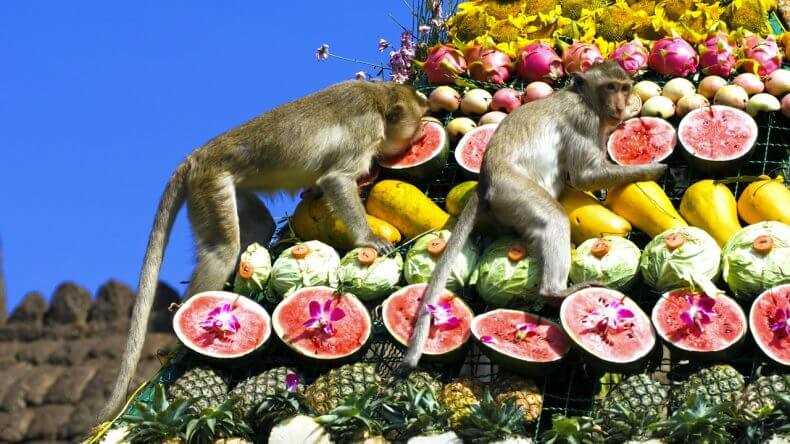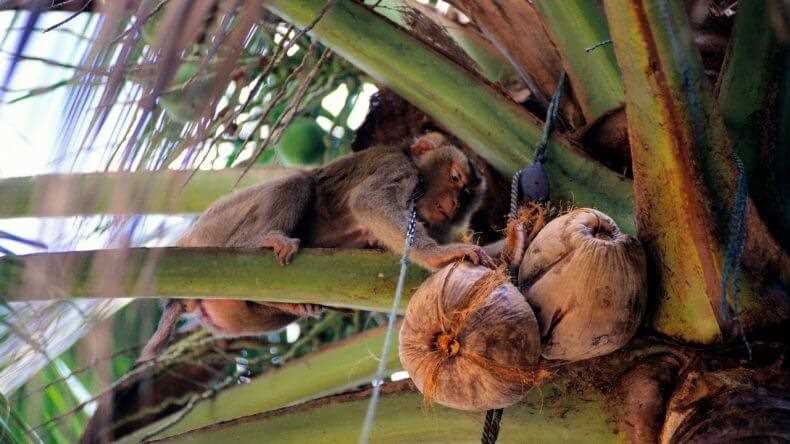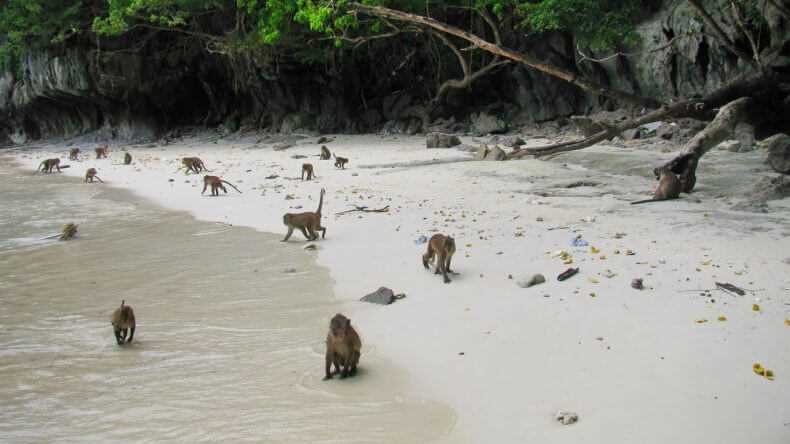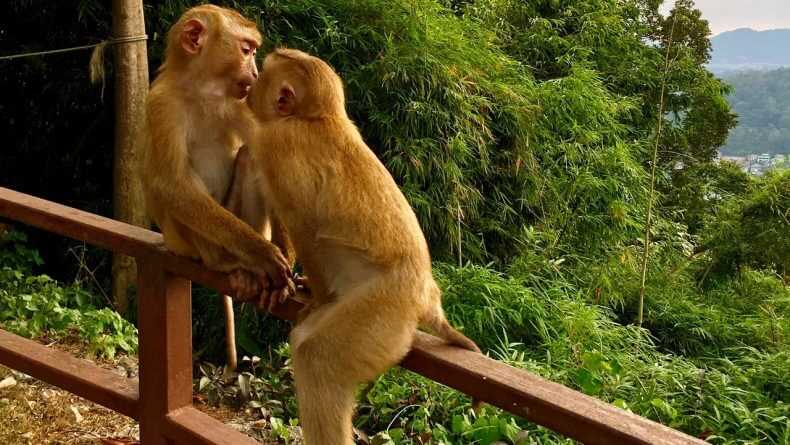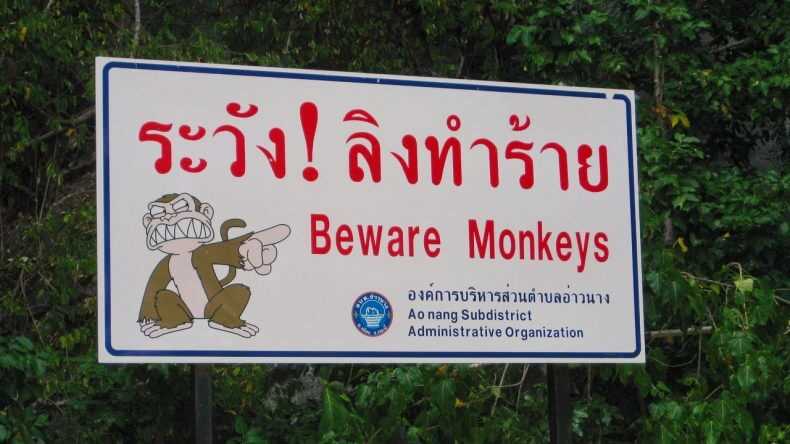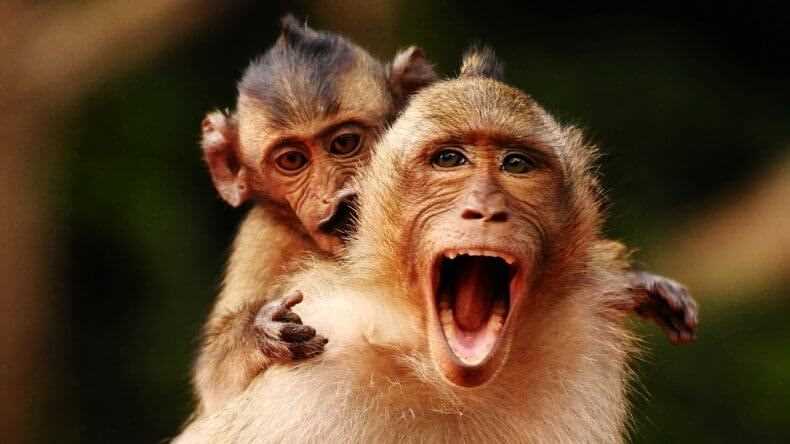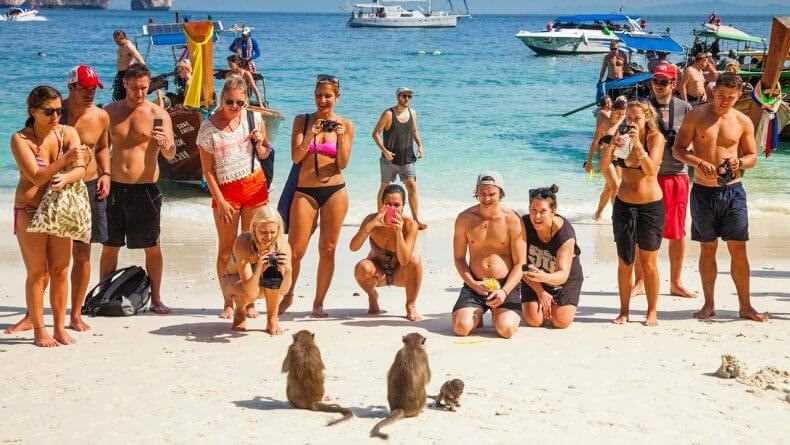Monkeys are everywhere in Thailand, especially on beaches, in parks, and in Buddhist temples. For aborigines, they are part of everyday life, its backdrop. Some of these human ancestors have remained wild. They are cautious and try to stay away from people. But there are such representatives of the people of bandar-logs, who are excessively pampered and fattened. This is the merit of tourists, who can not pass by a funny macaque without slipping it a handout. The primates are rather unpredictable – in the first minute of close contact they will allow themselves to be petted, and in any other minute they will find any opportunity to steal something from you.
Publicity
What monkeys live in Thailand
.
The most likely monkeys you see in Thailand are macaques and gibbons. These are the beggars that are involved in racketeering in places frequented by tourists. There are also langurs and orangutans in the jungles of the country. These animals rarely descend to the ground and spend most of their time in the upper tier of the tree thicket, they tend to avoid humans.
GibbonsGibbons in Thailand often serve as pets. Called “lar” by locals, they have a white mask on their muzzle and a beige and black torso. The intermittent whooshing that comes from the jungle in the morning are the sounds made by gibbons. They are graceful and beautiful, capable of deftly performing acrobatic tricks and climbing trees. Their popularity is the reason for poaching, which has become so widespread that some gibbons have to be recaptured and kept in rehabilitation centers so that they can return to their habitat.
Macaques
Macaques are ubiquitous in Thailand. They use the lower tier of woody vegetation for sleeping and as shelter. They forage on the ground, and are especially common near the banks of rivers and lakes, where they catch mollusks and small crustaceans in shallow water. In Krabi Province and Phang Nga, they have adapted to harvest sea crabs and mussels. These animals are not only good climbers, but they can also swim and dive. They carry their food reserves in their cheek pouches, almost like hamsters.
Monkey Banquet
.
The Monkey Banquet in Thailand is held once a year, on the last Sunday of November. The venue is the Phra Prang Sam Yot temple near the town of Lop Buri, a hundred and fifty kilometers from Bangkok. The tradition began in 1988, but the celebration is associated with a legendary event – the help of an army of monkeys led by Hanuman to the supreme deity Rama in a battle with the demon Ravana. Citizens bring sweets, fruit and other delicacies to the 7-meter-long table. In 2011, there were almost 4 tons of them.
There are usually more than five hundred macaques participating in the feast. Their appetites are excellent, but their manners are not. By the end of the event, the table is completely trashed, and the overeating apes sit in tree branches and throw scraps, leftovers, and cans of soda at the tourists. In the evening, tourists are invited to the Ramak monkey show led by experienced animal trainers.
The Monkey College
.
On Samui Island, the locals have adapted to harness the energy of the monkeys for peaceful purposes. They seek out the ripest nuts in the coconut plantations. On this island there are even road signs in literal translation in Russian – “Monkeys are working in the coconut plantations”. Don’t be lazy to stop and watch the labor rush of nimble tree-huggers. They harvest 700 to 1,000 coconuts a day. The Monkey College is organized for the training of macaques. It is located in the city of Surat Thani. In addition to instilling production skills, they are taught to entertain tourists. There is a similar institution on Ko Chang Island. There is also a daily monkey show.
Monkey Island
.
Monkey Island in Thailand is a 24-hectare piece of land just south of Pattaya. They were brought there for the entertainment of tourists, who were originally pilots of the U.S. Air Force. With no natural enemies, the colony of primates has multiplied to unbelievable sizes. There are thousands of them. In the absence of visitors, the macaques eat crabs and mussels. But the main source of food is donations from tourists. When they see a boat, the whole herd of monkeys pile onto the beach and wait for it to arrive. Then the real bacchanalia begins. The animals literally walk on their heads and drag everything that is bad and good. The number of stolen cameras, smartphones and small wearables is incalculable.
Monkey Mountain
Monkey Mountain in Thailand is Monkey Hill on the island of Phuket. It is located near Phuket Town, about midway between Ang Power village and Saen Beach. There are extremely many macaques there and they are engaged in their usual business – racketeering. At the entrance to the park there is a shop where they sell green bananas. It is better not to go up the hill without them, you won’t get away. Be very careful with the monkeys. They can bite you. Take care of your cameras and other things: macaques are not shy about going through their bags.
A monkey is dangerous!
To treat a monkey as a groovy, harmless animal is not right. It is kind only as long as it is fed or accidentally fought off the herd. Then she may even allow herself to be petted. A friendly collective of primates is equivalent to a gang of thugs in a dark alley, and if they’re hungry, their impudence exceeds all limits. They are able to steal from a tourist everything, to which their naughty hands can reach, and during the mass attack, resistance is completely useless. That’s why be extremely careful and watch out where the monkeys congregate. If something valuable has been stolen, you may get it back, but only at the first moment, and not by force, but with an exchange for something edible. If the monkey does not find in the stolen thing something useful to himself, then he will tear it up or break it. Do not get to the monkey with a hug. It can easily bite. In this case, seek immediate medical attention. The animal may be rabid.
If a monkey bite…
.
So, what to do if bitten by a monkey in Thailand? Even if you were not bitten but scratched, be sure to wash the wound with clean water and treat it with iodine or a similar antiseptic. After that be sure to consult a doctor, because wild and unvaccinated animal may be a carrier of the same diseases that are dangerous to humans – measles, polio, rabies, tuberculosis and others. In general, the entire list of diseases from the medical encyclopedia.
Simple safety measures
.
The largest number of monkeys in Thailand hang out on the grounds of Buddhist temples. The reason for this is the offerings of visitors to the supreme and other minor deities. And also where they are bred specifically for the amusement of tourists or travelers themselves have fed them. If you intend to visit such places, try not to have anything but clothes. Bags, umbrellas, cameras – anything that protrudes beyond the size of the tourist or hangs on it, can attract the attention of the primate. If you take a video camera, it would be better to have an inexpensive “soap box”. Try to stay away from females with cubs and not to offend members of the monkey collective, because somewhere nearby there may be a dominant male or female, who will definitely take measures to protect them. If a collective attack occurs, try to retreat quickly.
Read More:- Harmful insects in Thailand – from the edible to the most dangerous!.
- 15 the most popular attractions in Pattaya.
- 10 Most Beautiful and Surprising Temples in Thailand.
- Bangkok subway types – description, map, stations, cost.
- Pros and cons of last minute trips – how dangerous and how profitable are they?.
- The top 20 best things to see in Hua Hin.

